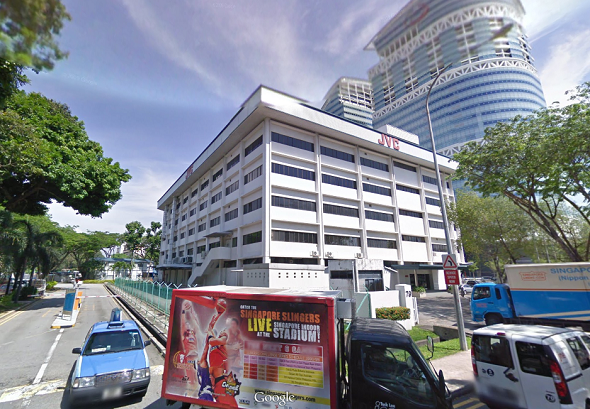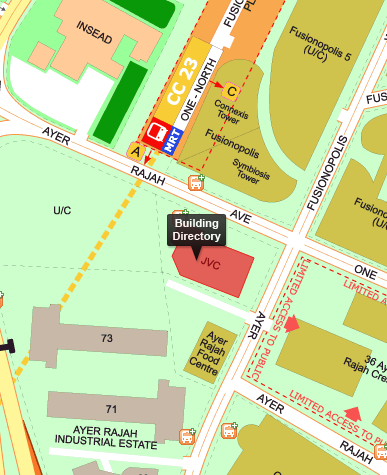Singapore’s Block 71 set to expand: govt minister at dialogue with incubators
Hi Block 71, meet Block 79. Google Streetview image from 2009.
Ever since Block 71, an old industrial building in Singapore, was relaunched in 2011 as an epicenter for the country’s startup community, it has become a hive of activity.
Its rental fees, cheap relative to other locations in Singapore, has attracted companies like JFDI.Asia, DropMyEmail, and Jungle Ventures. But it is also bursting at the seams.
In a room at Plugin@Blk71, an incubation space located at the hub, Minister-of-State Teo Ser Luck engaged in a dialogue session on August 27 with startup incubators on how the government can help the ecosystem.
On the topic of Block 71, he said that he has told JTC, a government-owned industrial estate developer, to demarcate the neighbouring Block 79 for startups as well. The building was formerly occupied by consumer electronics firm JVC.
Meanwhile, Block 71 will continue to serve as a home to startups.
“I want an identity for the startup landscape. This whole area will be purely for startups, no change. We’ll develop it in such a way that entrepreneurs can call this place home,” he said.
Minister Teo hinted that this could just be the beginning. He mulled the possibility that Singapore’s community centers, which are government buildings earmarked for community activities and admin services, could become incubators as well.
There are more than a hundred of these buildings in Singapore, spread out around the heartlands. They are not fully utilized at the moment.
“We could have startup incubators in the CCs. Cheap, cheap space, zero rental. We can get two, three rooms and convert them into incubators. Hopefully, this will create a ripple effect, then society can become more ready to embrace entrepreneurship, embrace failure,” he said.
Minister Teo has already successfully pushed for part of the centers to be converted into business enquiry stations. Small and Medium Enterprises are an integral part of the heartlands, he said.
SME renewal a national priority… sort of
This is the third dialogue session he has held with the ecosystem. The first was held with entrepreneurs, and the second with venture capitalists and angel investors.
The feedback will be collated and considered by the Entrepreneurship Review Committee, made up of prominent entrepreneurs and investors. The Committee is charged with making suggestions on how to finetune the government’s policies towards entrepreneurship.
The session provided a penetrating look at the government’s thinking towards startups. In summary, it’s a matter of economic survival.
In an era of technological change, some SMEs will inevitably drop out of the race as they may be unable to adapt. As such, the government needs new blood to replace the older firms and continue providing jobs for Singaporeans.
This attitude underlines much of government policy towards tech startups. While entrepreneurs may be more concerned with their company’s bottom line, the government is thinking like the CEO of Singapore Inc — it has to feed its own people.
As such, government money typically has strings attached — to the purse, wallets, and bank accounts of ordinary Singaporeans.
Anyway, while the community may be gratified by Minister Teo’s efforts to listen in, the reality is that there is a limit to what the Committee can do.
While participants at the dialogue session threw up some interesting suggestions, not all of them will be easy to implement, especially if it involves multiple government agencies.
An example is the ecosystem’s struggles with importing foreign talent to make up for the shortfall here. While probably the most pressing problem facing startups in Singapore, Minister Teo gave a dose of realism about what he can do.
“Tightening of labor is a national policy issue. It’ll take a while to change or tweak. And even so it may or may not be focusing on startups. So you’re trapped in a situation where you just have to make do with it,” he said.
Even if the government decides to adjust its labor policy, sectors that will be reviewed are more likely to be infrastructure-related sectors involving the building of roads, houses, and other public projects.
“We’ll just have to figure out other ways to do it, maybe we have to outsource, maybe we just have to be overseas for the majority of the work, but at least the nerve center is here, and the role of managing will be through Singapore,” he said.
Ways around talent shortage
There is no shortage of what these “other ways” could be. Vinnie Lauria of Golden Gate Ventures and Hugh Mason of JFDI.Asia suggested creating special startup visas specifically designed for founders or employees. These could come tied with a set time frame to either make things work or go home.
The devil is in the details. It’s unclear what length of time should be deemed sufficient for a startup to prove traction and whether government employees should even decide whether to extend a visa based on metrics from a world they do not understand.
Hugh also believes there might be a way to tap more on women and seasoned executives with in-depth domain knowledge to be part of the startup world.
He has seen weak participation by women at startup accelerator JFDI: While about 30 percent of attendees for events are women, they only make up five percent of applicants to its three-month, full-time bootcamps.
The room, again was dominated by men, seemed stumped. Even Minister Teo had no firm answers, except to say that Singapore women may be burdened by family responsibility and hence may not see entrepreneurship as a stable career.
But Hugh pointed out that with Singapore’s low birth rate of 1.20 births per woman, there should be a sufficient number of them who are unencumbered by the need to care for children.
Ultimately, it may come down to a single statistic: Singapore’s low unemployment rate of under two percent, which means residents are unlikely to start businesses for survival reasons.
The government might need to raise awareness about entrepreneurship from the perspective of self-actualization.
Other suggestions that were brought up included creating low-rental housing for entrepreneurs and creating an online platform to match MNC’s business needs to startup solutions.
Minister Teo seemed unconvinced about the first suggestion, pointing out that the government’s existing housing policies and home ownership schemes are affordable for Singaporeans.
The country’s small geographical size and relatively quick travel times — heartland to city typically takes 45 minutes by public transportation — also make it unnecessary.
“If I have a place for housing, I’ll rather convert it into an incubator,” he said.
On the online matching platform, Minister Teo said that the government has easy access and networks with MNCs and the larger SMEs. But its awareness of startups is relatively low, and that is an area it will have to beef up in order to confidently recommend solutions to meet the needs of large corporations.
The session ultimately hinted at the knowledge and conceptual gaps that exist between the startup community and the government. In official discourse, it seems that SMEs and startups are lumped together under one category.
When the issue about the shortage of labor was brought up, Minister Teo pointed out that his constituency is full of programmers that could easily fill up an apartment block.
But SMEs and startups have different needs, and they require different sorts of talent. Hugh pointed out that startups are built for scalability, and as such require engineers that may be more well-rounded, creative, and risk-tolerant than the average set.
So, unless the government’s understanding of small enterprises is more nuanced, tech startups may find itself faced with a set of policy changes that don’t exactly fit.
Map image from StreetDirectory.com
The post Singapore’s Block 71 set to expand: govt minister at dialogue with incubators appeared first on SGE.

 Yahoo Finance
Yahoo Finance 


